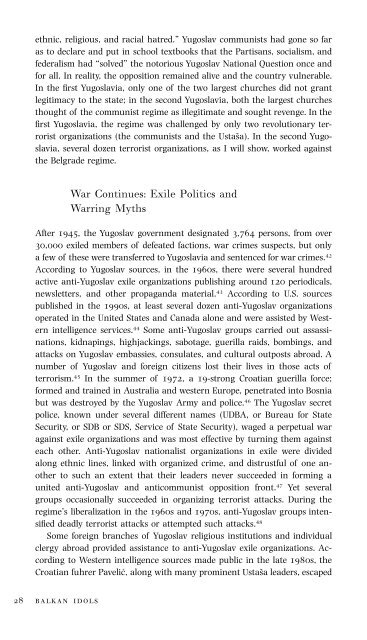Balkan Idols: Religion and Nationalism in Yugoslav States
Balkan Idols: Religion and Nationalism in Yugoslav States
Balkan Idols: Religion and Nationalism in Yugoslav States
You also want an ePaper? Increase the reach of your titles
YUMPU automatically turns print PDFs into web optimized ePapers that Google loves.
ethnic, religious, <strong>and</strong> racial hatred.” <strong>Yugoslav</strong> communists had gone so far<br />
as to declare <strong>and</strong> put <strong>in</strong> school textbooks that the Partisans, socialism, <strong>and</strong><br />
federalism had “solved” the notorious <strong>Yugoslav</strong> National Question once <strong>and</strong><br />
for all. In reality, the opposition rema<strong>in</strong>ed alive <strong>and</strong> the country vulnerable.<br />
In the first <strong>Yugoslav</strong>ia, only one of the two largest churches did not grant<br />
legitimacy to the state; <strong>in</strong> the second <strong>Yugoslav</strong>ia, both the largest churches<br />
thought of the communist regime as illegitimate <strong>and</strong> sought revenge. In the<br />
first <strong>Yugoslav</strong>ia, the regime was challenged by only two revolutionary terrorist<br />
organizations (the communists <strong>and</strong> the Ustasˇa). In the second <strong>Yugoslav</strong>ia,<br />
several dozen terrorist organizations, as I will show, worked aga<strong>in</strong>st<br />
the Belgrade regime.<br />
28 balkan idols<br />
War Cont<strong>in</strong>ues: Exile Politics <strong>and</strong><br />
Warr<strong>in</strong>g Myths<br />
After 1945, the <strong>Yugoslav</strong> government designated 3,764 persons, from over<br />
30,000 exiled members of defeated factions, war crimes suspects, but only<br />
a few of these were transferred to <strong>Yugoslav</strong>ia <strong>and</strong> sentenced for war crimes. 42<br />
Accord<strong>in</strong>g to <strong>Yugoslav</strong> sources, <strong>in</strong> the 1960s, there were several hundred<br />
active anti-<strong>Yugoslav</strong> exile organizations publish<strong>in</strong>g around 120 periodicals,<br />
newsletters, <strong>and</strong> other propag<strong>and</strong>a material. 43 Accord<strong>in</strong>g to U.S. sources<br />
published <strong>in</strong> the 1990s, at least several dozen anti-<strong>Yugoslav</strong> organizations<br />
operated <strong>in</strong> the United <strong>States</strong> <strong>and</strong> Canada alone <strong>and</strong> were assisted by Western<br />
<strong>in</strong>telligence services. 44 Some anti-<strong>Yugoslav</strong> groups carried out assass<strong>in</strong>ations,<br />
kidnap<strong>in</strong>gs, highjack<strong>in</strong>gs, sabotage, guerilla raids, bomb<strong>in</strong>gs, <strong>and</strong><br />
attacks on <strong>Yugoslav</strong> embassies, consulates, <strong>and</strong> cultural outposts abroad. A<br />
number of <strong>Yugoslav</strong> <strong>and</strong> foreign citizens lost their lives <strong>in</strong> those acts of<br />
terrorism. 45 In the summer of 1972, a 19-strong Croatian guerilla force;<br />
formed <strong>and</strong> tra<strong>in</strong>ed <strong>in</strong> Australia <strong>and</strong> western Europe, penetrated <strong>in</strong>to Bosnia<br />
but was destroyed by the <strong>Yugoslav</strong> Army <strong>and</strong> police. 46 The <strong>Yugoslav</strong> secret<br />
police, known under several different names (UDBA, or Bureau for State<br />
Security, or SDB or SDS, Service of State Security), waged a perpetual war<br />
aga<strong>in</strong>st exile organizations <strong>and</strong> was most effective by turn<strong>in</strong>g them aga<strong>in</strong>st<br />
each other. Anti-<strong>Yugoslav</strong> nationalist organizations <strong>in</strong> exile were divided<br />
along ethnic l<strong>in</strong>es, l<strong>in</strong>ked with organized crime, <strong>and</strong> distrustful of one another<br />
to such an extent that their leaders never succeeded <strong>in</strong> form<strong>in</strong>g a<br />
united anti-<strong>Yugoslav</strong> <strong>and</strong> anticommunist opposition front. 47 Yet several<br />
groups occasionally succeeded <strong>in</strong> organiz<strong>in</strong>g terrorist attacks. Dur<strong>in</strong>g the<br />
regime’s liberalization <strong>in</strong> the 1960s <strong>and</strong> 1970s, anti-<strong>Yugoslav</strong> groups <strong>in</strong>tensified<br />
deadly terrorist attacks or attempted such attacks. 48<br />
Some foreign branches of <strong>Yugoslav</strong> religious <strong>in</strong>stitutions <strong>and</strong> <strong>in</strong>dividual<br />
clergy abroad provided assistance to anti-<strong>Yugoslav</strong> exile organizations. Accord<strong>in</strong>g<br />
to Western <strong>in</strong>telligence sources made public <strong>in</strong> the late 1980s, the<br />
Croatian fuhrer Pavelić, along with many prom<strong>in</strong>ent Ustasˇa leaders, escaped


